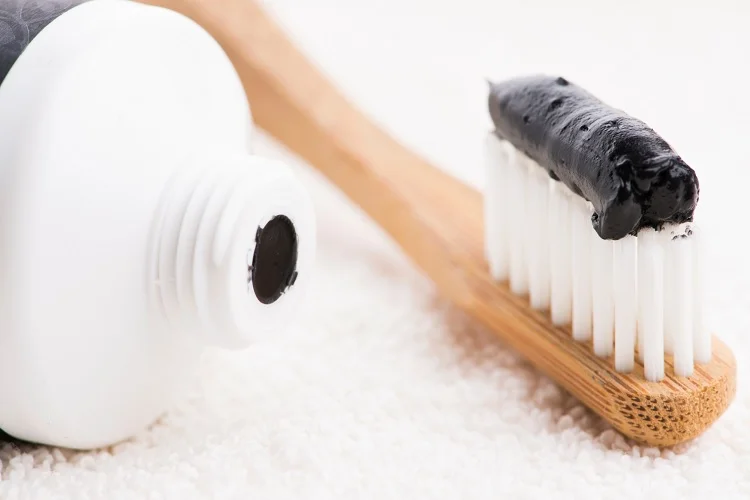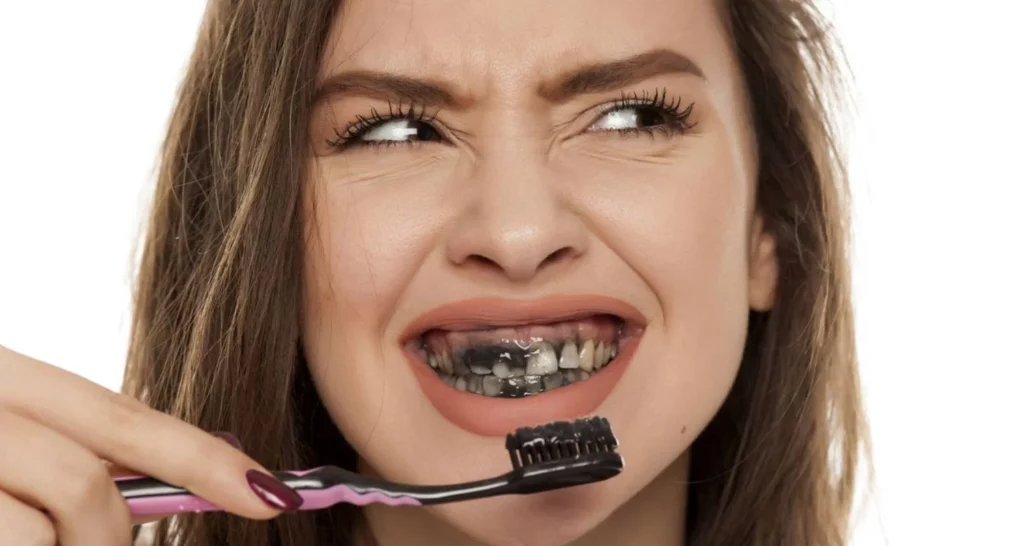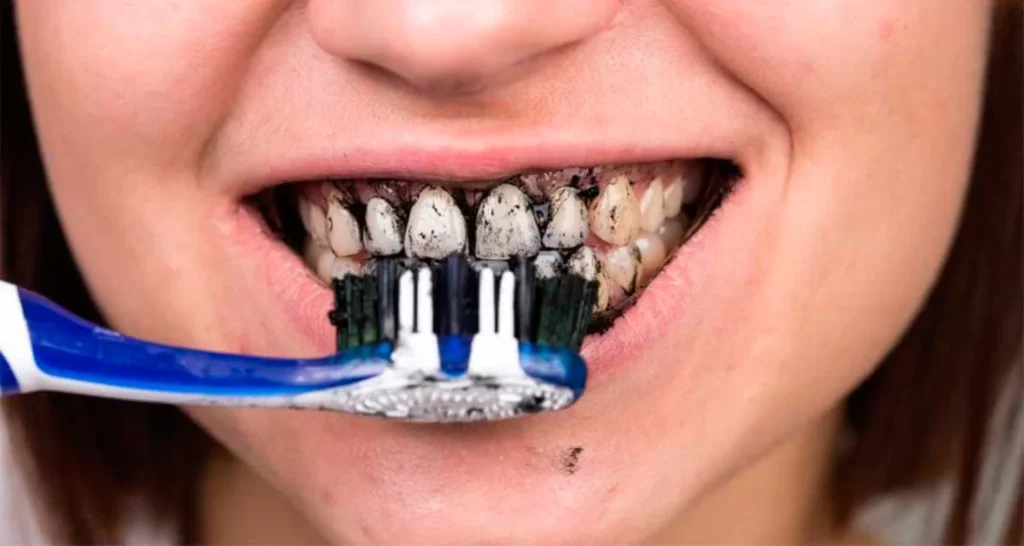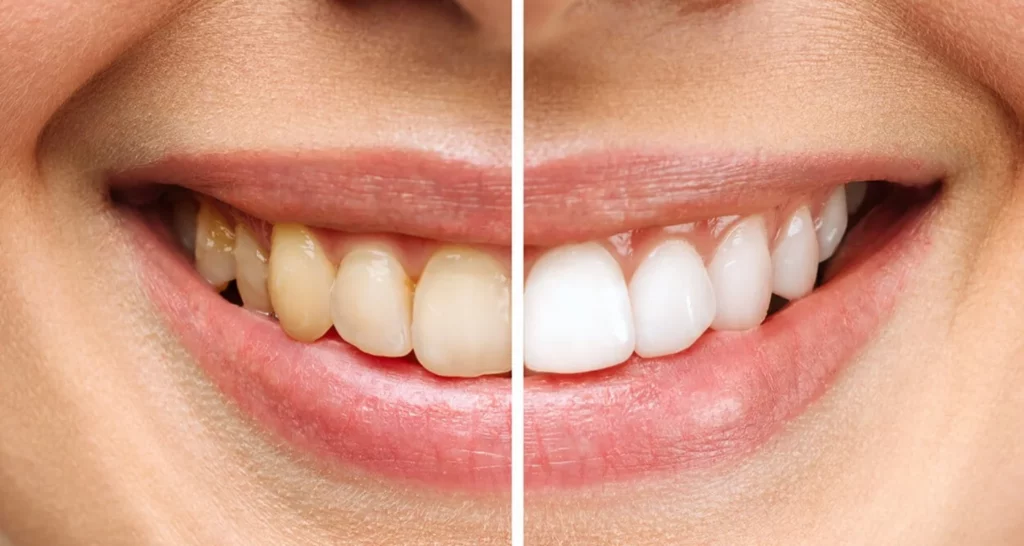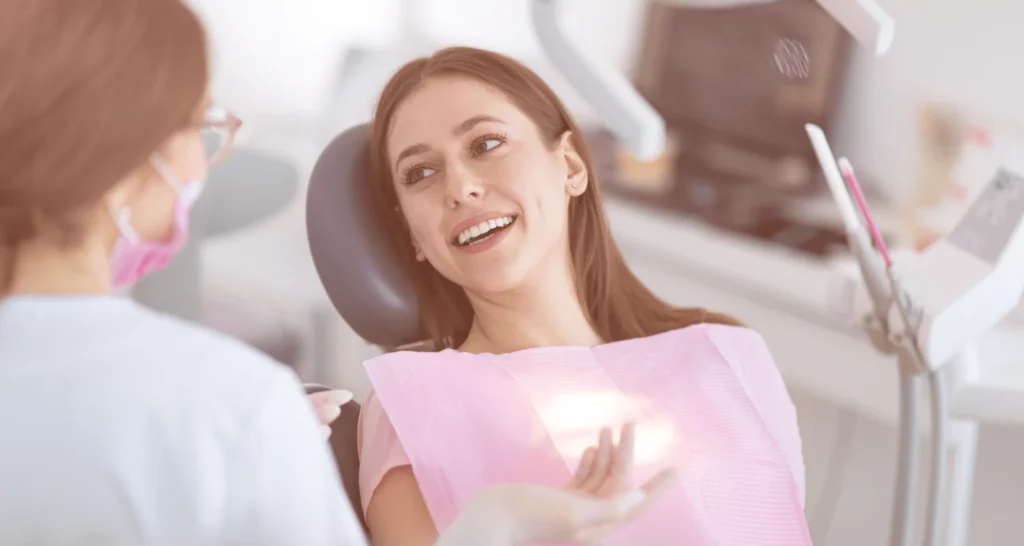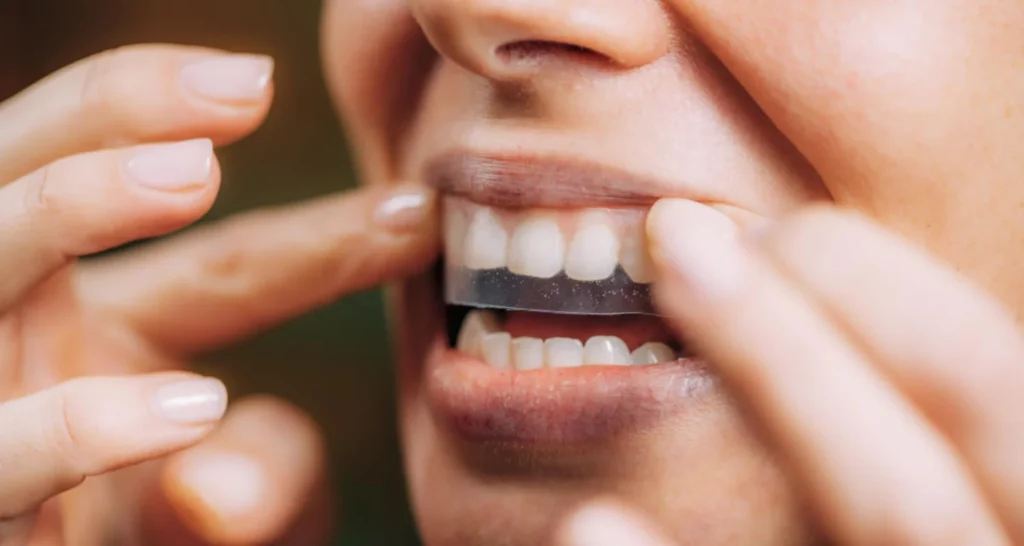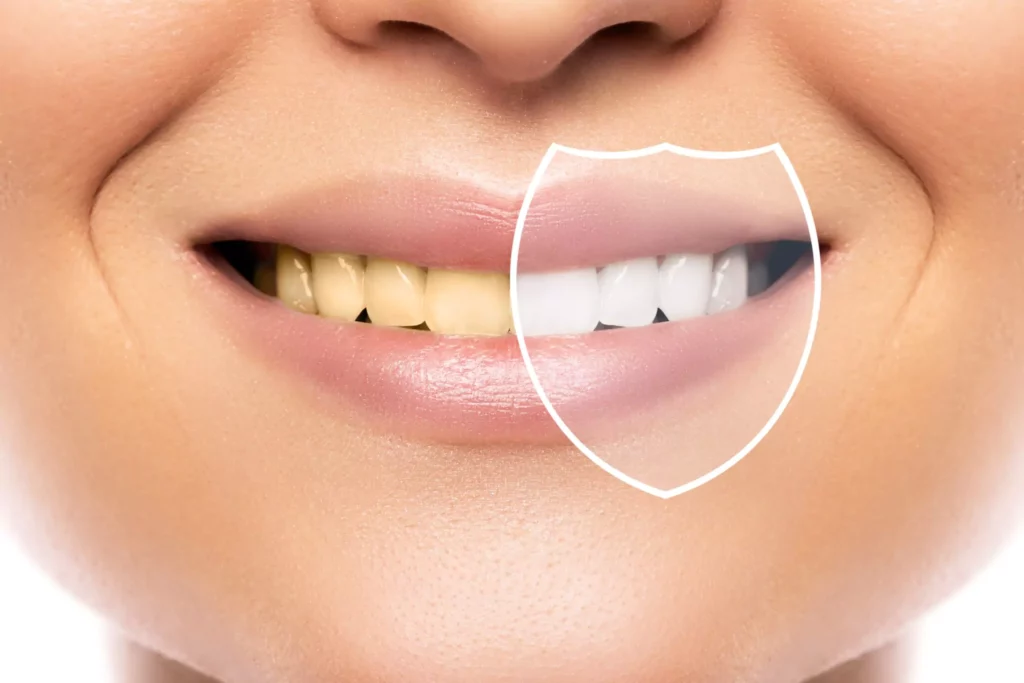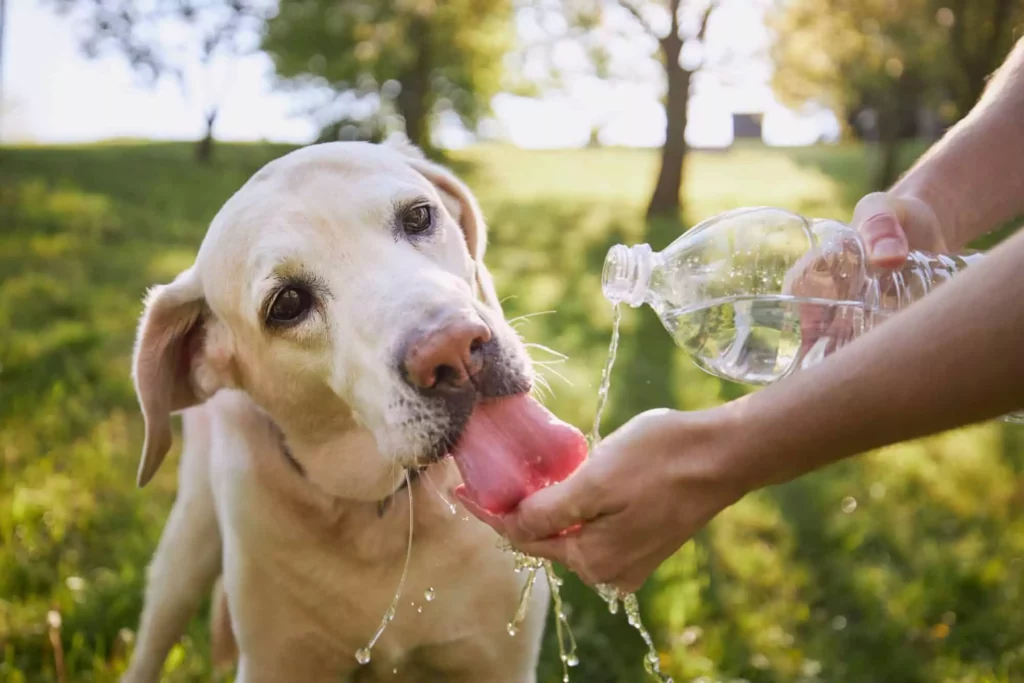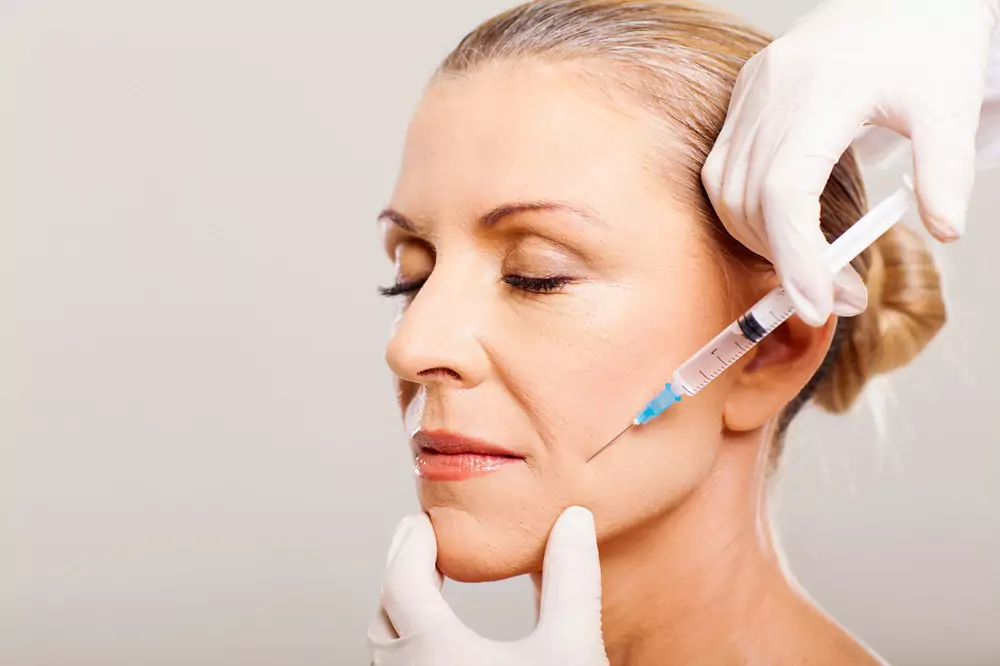Are you wondering if is charcoal toothpaste safe?
The color of the teeth and the effect of staining has gained relevance for one’s self-image. Having a smile with bright white teeth affects the impact projected when interacting with other people.
This trend has facilitated the promotion of the use of toothpastes with activated carbon to fight h teeth staining, with the use of a natural product.
What are the benefits for oral health? What risks can be had? Is charcoal toothpaste safe? Are there other alternatives to improve the white color of normal teeth? Some answers are shared below.
What is activated carbon? Is charcoal toothpaste safe?
The activated carbon used in the manufacture of toothpaste comes from burned coconut shells, olive pits, wood or bone charcoal, among other natural sources.
Carbon is treated at high temperatures to modify its internal structure and make it more porous, facilitating its abrasive characteristic. This can also be achieved by a chemical process, an option that is faster than heat treatment.
Is charcoal toothpaste safe for superficial stains?
Activated charcoal toothpaste is characterized by a fine and porous texture that helps to remove superficial stains caused by the consumption of tea, coffee or tobacco.
In addition, activated carbon also contributes to the elimination of toxins and bacteria present in the mouth, promoting a better oral health condition. Activated charcoal toothpaste is a tooth whitening alternative that should be used sparingly, as excessive use can wear away tooth enamel, leaving the dentin exposed, a situation that leads to other oral health conditions such as tooth sensitivity and gum issues.
It is important to note that this type of toothpaste does not whiten teeth. It serves to eliminate superficial stains but does not act on internal stains.
What do the studies show? Is charcoal toothpaste safe for oral health?
Studies that have been carried out on the effects, is charcoal toothpaste safe for oral health? especially in relation to dental whitening; they indicate that this element acts as an absorbent agent to eliminate the particles that cause stains.
They warn that it has been observed that toothpastes with activated carbon do not have the amount of fluoride recommended by the American Dental Association (ADA) to protect teeth against cavities, a deficiency that does not make it suitable for oral health and in the long run, it represents a risk.
In addition, there is no verified, reliable information on the effects that activated carbon can have on the materials used in some dental restorations, such as crowns and white fillings.
In general, studies show that activated charcoal absorbs the plaque accumulated on the tooth surface, as well as other substances that influence the staining of teeth, which helps remove surface stains from the teeth. tt should be used in moderation so as not to affect dental enamel, due to the abrasive characteristics of carbon.
Another aspect that must be taken into account is that the effects of toothpaste with activated charcoal are different for each person.
Is charcoal toothpaste safe and what are its benefits?
Using this type of toothpaste, with the necessary precautions, offers some positive effects for oral health:
● Helps remove surface stains on teeth
● Reduces bad breath (halitosis)
● When used occasionally, after a professional cleaning, it helps prevent stains.
What are the risks of toothpaste with activated carbon?
Is charcoal toothpaste safe? Excessive use of charcoal toothpaste, without taking into account the manufacturer’s or dentist’s recommendations, has consequences for oral health:
● It affects the dentin and causes the loss of dental structure, which cannot be recovered.
● Increases the risk of tooth decay and tooth sensitivity.
● Carbon particles can accumulate in the gums, causing inflammation and trauma to those tissues.
● Pregnant women, those using contraceptives or taking oral medications should avoid the use of activated charcoal.
● It can generate stains on old teeth and dental restorations (veneers, bridges, crowns, fillings).
Is charcoal toothpaste safe? 5 recommendations for them use
These are some recommendations for making proper use of a toothpaste with activated charcoal.
1. Consult a dentist: Before starting to use toothpaste with activated carbon, it is suggested to consult with a dentist to evaluate the state of your teeth and receive personalized guidance on the use of this product.
2. Soft brushed: It is important to have a smooth brushing technique. Activated carbon is a fine, abrasive powder that should not be applied with excessive pressure. It is advisable to brush with circular movements to avoid wearing down the enamel.
3. Complete oral hygiene: After applying the toothpaste with activated carbon, it is necessary to brush regularly to remove carbon particles that may have remained between the teeth, use dental floss and mouthwash.
4. Follow the instructions: It is important to read and follow the instructions provided by the manufacturer to obtain the best results and avoid any unwanted effects.
5. Moderate use: It is recommended to use it two to three times a week, so as not to affect dental enamel with its subsequent effects.
Are there other options for teeth whitening?
Is charcoal toothpaste safe? Yes, but there are several alternatives to whiten teeth, other than activated carbon:
● Whitening rinses and strips: Rinses that help in teeth whitening have hydrogen peroxide or carbamide peroxide. Strips are flexible sheets to be attached to the teeth.
● Home whitening kits: These kits include whitening gels and moldable trays that adapt to the teeth. The instructions of the product should be followed and the recommended time should not be exceeded to avoid sensitivity.
● Whitening toothpaste: These toothpastes contain ingredients that help remove stains and brighten tooth enamel. It is recommended to use ADA approved products and follow the instructions for use.
● Treatments in the dental office: Dentists offer professional whitening treatments that can be more effective and faster than at-home options. Procedures may include the use of light lamps, LED, or the application of highly concentrated whitening gels.
Check with your dentist first if is charcoal toothpaste safe
If you want to apply a home technique for teeth whitening or use toothpaste with activated charcoal to achieve a better appearance of your teeth, it is important to first consult your dentist to evaluate your oral health and receive personalized guidance.
Regarding teeth whitening, the ADA recommends maintaining good oral hygiene, using an approved whitening toothpaste and limiting the consumption of foods and/ drinks that stain teeth, as well as regular dental prophylaxis with your dentist.
Conclusion
Is charcoal toothpaste safe? Activated charcoal toothpaste can help remove surface stains and reduce bad breath, but its abrasive nature can wear down enamel, leading to sensitivity and decay if overused. It also lacks sufficient fluoride, crucial for preventing cavities, and may affect dental restorations.
For safe use, consult a dentist for personalized advice, use charcoal toothpaste sparingly, and follow manufacturer instructions. Alternatives like whitening rinses, strips, home kits, and professional treatments are effective options. Prioritize good oral hygiene and regular dental check-ups for the best results.
Frequently Asked Questions
Is it safe to use charcoal toothpaste for your teeth?
The American Dental Association has not offered any evidence supporting the effectiveness or safety of charcoal toothpaste. In reality, it could potentially damage both your gums and teeth. Activated charcoal is an abrasive substance with the potential to erode the outer layer of the tooth, known as enamel.
Has the FDA approved charcoal toothpaste?
While it offers advantages as mentioned earlier, activated charcoal is NOT endorsed by either the American Dental Association (ADA) nor The Food and Drug Administration (FDA) for dental application. Research indicates that activated charcoal’s abrasiveness is unsuitable for the tooth’s outer layer, the enamel.
What makes charcoal toothpaste superior to regular toothpaste?
Advantages and disadvantages of using charcoal toothpaste:
It has the potential to reduce external stains: Activated charcoal possesses gentle abrasiveness, which could aid in eliminating surface stains while brushing. Furthermore, its absorbent nature might allow it to soak up specific stains, subsequently washed away upon rinsing the toothpaste from the mouth.
Is it safe to use a charcoal toothbrush every day?
Using activated charcoal regularly can actually harm your teeth by wearing down their enamel. This abrasiveness is the reason charcoal toothbrushes do not meet the criteria for the American Dental Association’s Seal of Acceptance. Once the enamel is worn away, it cannot be restored, potentially causing tooth sensitivity and discoloration over time.
Share:
References
1. Gutiérrez Lorena (July 6, 2023) Activated carbon for teeth: what products are there and how to use them / https://www.dentaly.org/es/blanqueamiento-dental/carbon-activado/
2. Huizen Jennifer (December 8, 2020) What are the benefits of activated charcoal? / https://www.medicalnewstoday.com/articles/es/carbon-activado
3. Martínez Nicolás, Sanhueza Daniela, Vallejos Viviana, Pezo Daniel (October 10, 2020) A current view on activated carbon in toothpastes; Bibliographic review / https://revistas.uv.cl/index.php/asid/article/view/2644/2573
4.Roberts Catherine (October 21, 2022) Ingredient Researcher: Activated Charcoal in Toothpaste / https://www.consumerreports.org/es/salud/carbon-activado-en-la-pasta-de-dientes-a2586017556/
5. Santos-Longhuts Adrienne (Abril 17 de 2023) Charcoal Toothpaste for Teeth Whitening: The Pros and Cons / https://www.healthline.com/health/dental-and-oral-health/charcoal-toothpaste
6. Valeii Kathi (Febrero 1 de 2022) Does Charcoal Toothpaste Work? / https://www.verywellhealth.com/charcoal-toothpaste-5214587
-
Nayibe Cubillos M. [Author]
Pharmaceutical Chemestry |Pharmaceutical Process Management | Pharmaceutical Care | Pharmaceutical Services Audit | Pharmaceutical Services Process Consulting | Content Project Manager | SEO Knowledge | Content Writer | Leadership | Scrum Master
View all posts
A healthcare writer with a solid background in pharmaceutical chemistry and a thorough understanding of Colombian regulatory processes and comprehensive sector management, she has significant experience coordinating and leading multidisciplina...



